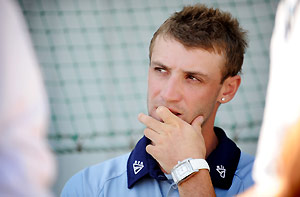JackJumpers' NBL title was special - but where does it sit among Tasmania’s top ten sporting moments?
It’s a pretty good time to be a Tasmanian sports fan right now. After years in the sporting wilderness with not much to celebrate,…
 Twitter training might just become part of media skill development for the modern athlete, if it isn’t already. Once you get past the “I had toast for breakfast” tweets, athletes tend to open up online, and sports administrators don’t necessarily like it.
Twitter training might just become part of media skill development for the modern athlete, if it isn’t already. Once you get past the “I had toast for breakfast” tweets, athletes tend to open up online, and sports administrators don’t necessarily like it.
It’s different when a microphone is shoved in one’s face after sporting triumph or despair.
The four words to follow are inevitable: “how do you feel?”
The sideline reporter knows a cliched answer is likely to such a cliched question, and in a way that’s what they’re hoping for. So when Sally McLellan strode through for Olympic Silver in the 100-metre hurdles at Beijing, we were all in shock.
Not just because she came second, but because her post-race interview was so refreshing and unique.
At one stage she turned the interview around on Pat Welsh with the now famous line “Did you see me?”
She might have won silver, but it was gold television.
It proved to me that the PR behind big sport should throw away the media training manual. Journalists are after unique angles and it’s difficult when sport stars are so guarded and machine-like in their answers.
Which brings me back to Twitter and the internet in general.
With the media looking for more and more stories on sport, it’s no wonder the internet has delivered: Phil Hughes announcing he was axed from the Test team via Twitter; Stephanie Rice’s Facebook profile status changing from “in a relationship” to “single”; and a few years ago, YouTube footage of Marcos Baghdatis at the Australian Open joining Cypriot fans in abusing Turkish supporters.
Of course, there are many more examples.
Just this week, Andy Roddick was critical of US Open organisers trying to prevent Twitter talk on matches.
Organisers fear corruption and betting scandals, but Roddick sees the move as a form of censorship.
I fear administrators are going to really crack down on internet use by athletes. The last thing we want is ghost writers dominating the blogosphere, advising sportspeople on what they should say.
One of my favourite blogs is Andrew Bogut’s.
It’s full of typos and it’s often just him talking about Seinfeld-esque nothing moments. But it shows him as a normal person.
If you stumbled across his writing, you certainly wouldn’t realise he was an NBA star. He tells it like it is.
At the start of the year, he had a go at a former Fairfax, now News Ltd journo for double-crossing him. He also gave a real insight into recovering from injury and how frustrating it was watching the Bucks from the sideline.
I foreshadow more and more controversies regarding the internet and sport stars.
Whether it’s a player criticising a team mate, the officials, or just letting out frustration, it’s bound to happen online as we go forward.
However, if sportspeople feel more comfortable expressing their thoughts on a laptop rather than to a journalist, I’m all for it.
Especially if we continue to see Darius Boyd and Tim Cahill-like interviews.